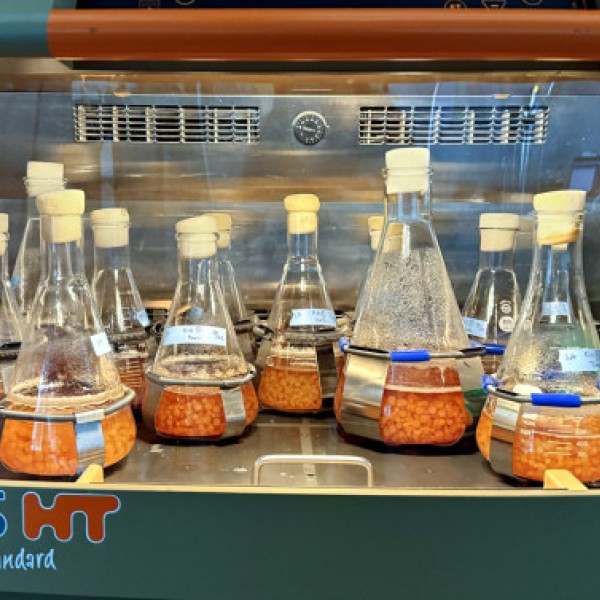- Animal Science
- Biological and Environmental Engineering
- Food Science
- School of Integrative Plant Science
- Climate Change
- Food
- Health + Nutrition
A summer internship enables students to work with a multidisciplinary team of scholars who are making poultry more nutritious and sustainable, from developing algae as a digestive enzyme-rich feed source, to measuring bioavailability of nutrients in human consumers, to recycling the proteins in feathers.
“I learned a lot of new techniques, procedures and skills, but more than that, I was able to see the mindset you need to have to go into research and innovation,” said Christopher Chan ’22. “In order to innovate, you have to be able to think of a problem in a way that nobody else before you has. That’s a really valuable mindset to have, not only in this lab, but also in the future, whatever I end up doing.”
Chan was one of six undergraduate students in the first, 2021 cohort of summer interns in Sustainable Agriculture and Food Systems, a 10-week program overseen by Xingen Lei, professor in the Department of Animal Science, and Dennis Miller, professor emeritus in the Department of Food Science. Applications for this year’s cohort are due Feb. 15.
Chan, a biology major, interned in Lei’s lab and worked on finding ways to break down and recycle the protein in chicken feathers for use in other animals’s feed.
Summer 2023 applications
Applications for summer 2023 are open now and due Feb. 15, 2023.
For more information and to submit applications, contact ddm2 [at] cornell.edu (Dennis Miller) and xl20 [at] cornell.edu (Xingen Lei).

“This project involves faculty members from several disciplines who are working together on research to find solutions to one of the greatest challenges facing our world in the 21st century, which is providing an adequate, safe, nutritious, accessible and sustainable food supply to an expanding global population,” Miller said.
The summer internship was developed as part of a $10 million, five-year U.S. Department of Agriculture grant that aims to transform the U.S. poultry industry, including by training the next generation of researchers and agricultural leaders. The multidisciplinary project provides undergraduate interns with hands-on experience in nutrition, animal science, plant and soil science, and biological, chemical and environmental engineering. Interns also interact with students in similar programs for a journal club, field trips and a final poster presentation. Lei and Miller made the internships available to students from any institution with the goal of recruiting more diverse candidates, Lei said. Interns for the first two years have come from Cornell, the University of Hawaii and the University of Arkansas.
Alessandro Rocchi, a senior at the University of Arkansas, was one of four interns in Summer 2022. He worked in the lab of Beth Ahner, professor in Cornell’s Department of Biological and Environmental Engineering and Senior Associate Dean in CALS. She is developing algae as an alternative to soybean and fish meal in poultry feed. The algae feed is expected to fortify chickens with hydrolytic enzymes, including one developed by Lei’s lab, that help animals break down and digest phosphorus in their feed, reducing phosphorus excretion by animals and preserving nonrenewable phosphorus deposits on Earth. The project combined Rocchi’s interests in poultry science and environmental science and gave him experience in a smaller lab setting with more opportunities for responsibility and initiative, he said.
“This was one of the highlights of my undergraduate experience,” Rocchi said. “This is a great opportunity for students. It gives you a chance to branch out of your comfort zone and find something you didn’t realize you’d enjoy.
Also collaborating in this multi-disciplinary project are Kimberly O’Brien, professor in the Division of Nutritional Sciences and Johannes Lehmann, a Liberty Hyde Bailey Professor with joint appointments in the School of Integrative Plant Science and the Department of Global Development.
As part of this USDA grant, Lei and Miller also developed a new minor for Cornell undergraduates in Sustainable Agricultural and Food Systems.
“U.S. broiler production impacts the food, energy and water nexus, human nutrition and health, climate change and environmental protection, and economic prosperity,” Lei said. “This program was designed to offer students the opportunity to learn and work at the intersection of all those critical issues.”
Krisy Gashler is a writer for the College of Agriculture and Life Sciences.
Keep Exploring

News
Mycelium, the vegetative, root-like network of fungi, has the power to transform food waste into new, life-sustaining food.
- Food Science
- Agriculture
- Climate Change

Field Note
- Dairy Fellows Program
- Animal Science
- Agriculture

We openly share valuable knowledge.
Sign up for more insights, discoveries and solutions.


